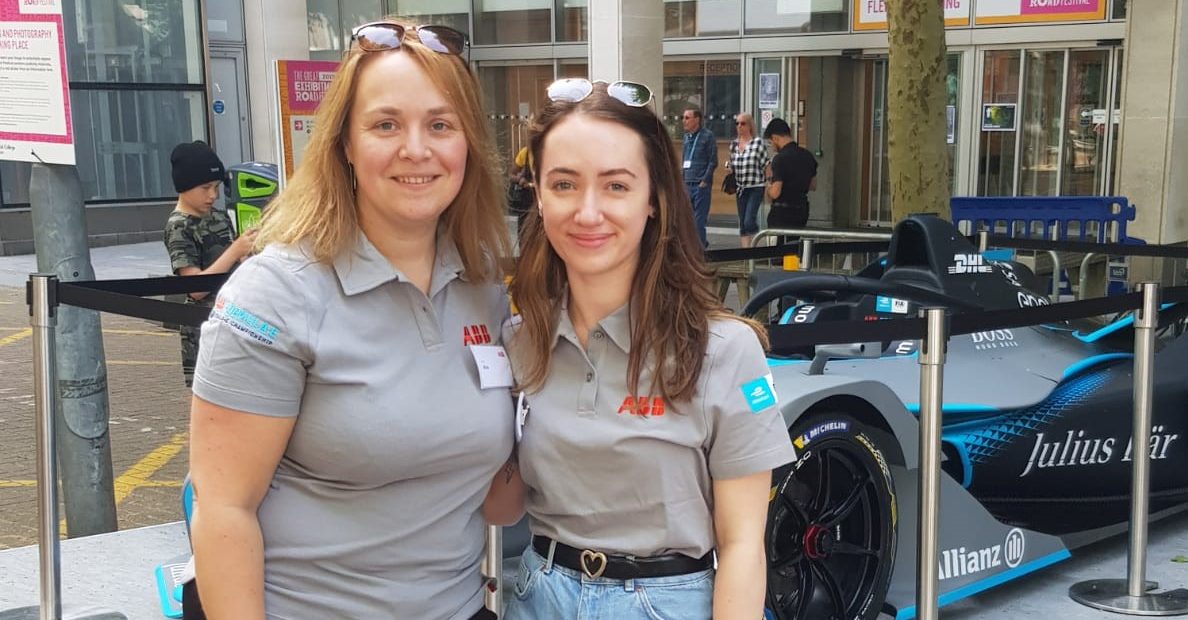Meet marketing apprentice Ellie Armitt

For young people, becoming an apprentice can be a great way to kickstart their career and develop the valuable skills and experience they need for their future. For companies, running an apprenticeship scheme can help to identify and nurture talent, producing skilled, enthusiastic employees who could change the future direction of the business.
A properly run apprenticeship scheme can offer a mutually beneficial experience for both young people and employers alike.
This National Apprenticeship Week, Educate investigates what the broad benefits are to employer and employee through a discussion with Kim Thwaites, marketing communications manager for ABB Measurement and Analytics and Ellie Armitt who recently joined Kim’s team as a marketing apprentice.
Kim – What do you think makes a successful apprenticeship scheme?
Finding the right talent is important and we are well supported here by our HR department with years of experience in sourcing apprentices. It is important to ensure the apprentice is well supported with both internal and external training to make sure they receive the most fully rounded experience possible.
When it comes to internal training, ABB’s programme is excellent, having been shaped over many years to offer our apprentices the best possible insight into all aspects of what we do, from product design and manufacture through to sales and marketing. The value that this can offer in terms of career development is proved by the number of managers throughout the business who started their careers with ABB.
Kim – What advice would you offer to a colleague or Marketing Manager in a similar situation that was thinking of taking on an apprentice?
When hiring an apprentice, it is important to remember that you gain an extra person to share the workload long-term, but as a mentor part of your week will be dedicated to training.
Apprentices tend to come straight from school and may not know things that we now take for granted such as how to use the outlook calendar or how to write a professional business email. To get the best of out an apprenticeship scheme you must remember that an apprentice is there to learn, not to take up general administration tasks.
Kim – It is often the case that we learn things when we are mentoring, do you think you have gained from the experience?
Definitely. It is important to listen and take on feedback, so I quickly developed my skills as a coach.
It is a tough transition from schoolwork and a recognisable school day where almost everything is set out for you to a longer workday with new tasks and challenges where you have to start taking responsibility for managing yourself and your time. The interesting thing about teaching some of the basics such as diary management or professional email communication, is that it can make you evaluate how you approach your own workload and the way you approach things.
I have been impressed by how quickly Ellie learns to use new software often picking up tips and tricks and sharing them with me, so the learning can sometimes be a two-way street.
Ellie – What led you to apply for the Marketing Apprenticeship at ABB? How did you find out about the opportunity?
I knew that I did not want to go to university and so I applied for lots of marketing apprenticeships, especially in digital marketing. I did an internship at the cosmetics company Avon in Northampton. I got that position through a family friend who worked there. I worked alongside the Digital Manager and created short videos and gifs for Instagram. In the time, some of the highlights included working on a photoshoot in London for nail polish and being involved with the whole process of video creation, working with the editing team and with agencies to get a promotional video shot and completed.
It was a really good experience and really helped to influence my decision to get into marketing.
Ellie – Did you have advice from school, college, or your parents to consider applying for an apprenticeship?
The experiences of my family influenced my decision to choose an apprenticeship over university. I have older cousins who were not convinced of the benefits of university. I also have a friend doing an accountancy apprenticeship to complete her accountancy degree.
While I would say friends and family influenced my decision, when it came to actually finding an apprenticeship, I did all the research on my own. My school was very university focused. We had tutor group sessions dedicated to how to fill in UCAS applications for university but there was never anything about how to find or apply for apprenticeships. I went to careers fairs which were a great opportunity to talk to businesses about the apprenticeship schemes they offered, but they were always in engineering, IT or Hair & Beauty, never in marketing. I ended up doing my own research via the government apprenticeship website but found roles by going through recruitment agencies to find marketing apprenticeships.
Ellie – How do you find working with the team at ABB?
The team at ABB are a little family. Everyone knows everyone and many have worked there for a long time. The great thing for me is that I have been treated as a peer since I joined. Everyone has time to explain their product and how it works. One of the managers has said, ‘I forget you’re an apprentice. I see you as part of the team’. I am treated the same as everyone else.
Ellie – What are the top three things you have learnt so far in your apprenticeship? These can be general working world related.
1. Managing my time – I was always very organised, but not very good at saying no to stuff. Thanks to a training course I did here that talked through a Priority to Urgency chart Eisenhower diagram, I am now much better at organising myself and my workload. I can still struggle to say no to things but have at least learned how to manage it!
2. It’s okay to make mistakes. As in any workplace, you are understandably held accountable for your actions, but equally I know that I have the support I need if things go wrong or if I am uncertain about how to approach a particular task or project.
3. These apprenticeships are what you make of them – you could cruise, but if you put in 110% you get that much back. I’ve realised that the better I am at doing my job, the more people within the organisation notice the work that I do. Go in with a positive attitude that you are going to do well, and you’ll be surprised by how much you can achieve.
Do you have contact with any other apprentices at ABB?
Yes. ABB is a huge company, and we have several sites in the UK as well as across the globe. I am based at the Stonehouse site in Gloucestershire – I am the only one doing marketing. All the others are doing engineering.
We are a network; I can call on this group any time and you always have each other. If I have HR questions, I will go to Lauren the apprentice in HR, and equally I help Lauren with making videos.
Ellie – Did you feel it was important when you applied for the apprenticeship to work for a large organisation like ABB?
There were two companies in my shortlist, one was ABB and the other an IT company nearer my home with 11 other employees. I felt I would have more support in a large organisation.
You might be exposed to more responsibility in a small organisation, but I don’t feel like I have lacked responsibility here. For example, in autumn last year I organised a big Channel Partner meeting event. It was scary being responsible for those bigger projects, but I knew my manager was there if I needed her, and the senior managers at ABB believed in me to do the job.
Ellie – Do you think schools and colleges could do more to promote apprenticeships?
I think they could do more to give students more information about all the options available. I think part of the problem is our culture, where apprenticeships are somehow seen as being less prestigious than a university
education – that really needs to change. I think doing more in schools to build awareness of what apprenticeships can offer will help change the culture.
Ellie – Could there be improvements made in educating people about the benefits of apprenticeships? If so, what could change?
Yes, definitely. I think the main way is to give real-life examples of people who succeeded as a result of taking up an apprenticeship. There are lots of examples in all areas of business of people who started their careers as an apprentice and went on to either become senior managers or even set up their own business empires. You can look at Bill Gates and Richard Branson saying they dropped out of university and did their own thing. That is a good start, but they’re a certain personality type and aren’t as easy to identify with as people from your community.
A good example in our own business is Les Slocombe. Les is now our Northern Europe Hub Operations Manager but started his career as an apprentice, working his way up through different parts of the organisation to build experience in key areas such as engineering, sales and management. Apart from gaining experience, Les also benefited from the discipline an apprenticeship can give you.
Kim – Do you think that companies themselves could do more to promote apprenticeships?
Yes, ABB has a graduate programme, an apprenticeship scheme and offers internships, but they are not widely advertised.
This is something we are working on changing. ABB partners with Imperial College London and we recently ran a Graduate Day at Imperial College. Promoting apprenticeships and graduate careers days is a good way for ABB to access new recruits but it’s also a good marketing opportunity for the company as a whole.
Ellie – Are there things you feel you have learned doing the job that you may not have learned in a classroom setting?
One of the biggest things I have learned is how to interact with different types of people. At school, you tend to associate with people who are more like you, whereas as at work you find yourself working alongside people who may be completely different, whether it’s in terms of their background, their age or their approach to things. For example, if a manager is particularly detail oriented, I ensure presentations, or plans are proof read three to four times before I ask them to review it.
This experience has been very useful in helping me to develop my skills in other areas, such as how to pitch ideas differently to different people.
Ellie – So, would you recommend an apprenticeship?
Yes, I would definitely recommend an apprenticeship. I have a good mentor; she is firm but fair and a great person to learn from. I am treated as an employee and equal, rather than feeling like a student or a temporary employee. I am part of the team.
Ellie has been an apprentice at ABB for just over a year and has a further six months to go in her training.
For further information, click here.
Sponsored content



